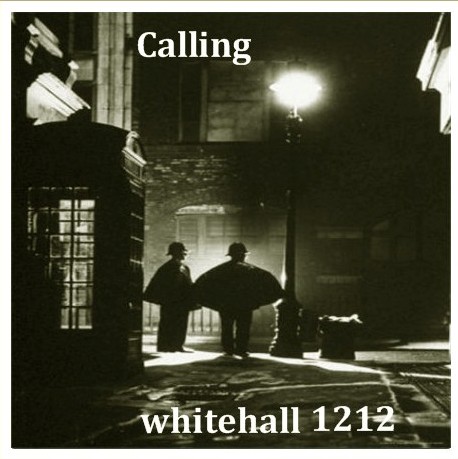 OTRR certified "Whitehall 1212" v2.0 (2 CDs) is available for download from Dropbox or OneDrive. Thanks to all those who made this collection possible.
OTRR certified "Whitehall 1212" v2.0 (2 CDs) is available for download from Dropbox or OneDrive. Thanks to all those who made this collection possible.
These links will be available for 30 days.
Dropbox: https://www.dropbox.com/sh/s9g77tsirfdwfuu/AAAIc5dXYFlo3feOG6uvV_MOa?dl=0
OneDrive: https://1drv.ms/f/s!Al5Sbh6lIkj5jKU7avmjh2vpEX3y1A
Series summary:
Named after the then famous telephone number of Scotland Yard—the headquarters of the London Metropolitan Police Force, Whitehall 1212 was a weekly crime drama radio show. It ran from November 18, 1951 until September 28, 1952.
The stories were true and stated to be “the plain unvarnished facts, just as they occurred”. The show, in their own words, presented some of the "most baffling cases" as hosted by the fictitious Scotland Yard Chief Superintendent John Davison. Davison was said to be the curator of the Yard’s “Black Museum” a name given it in 1877. Artifacts described in the show were the basis for the story about the crime.
Whitehall 1212 was actually produced in the United States at NBC. The stories were well researched by Percy Hoskins, Chief Crime Reporter of the London Daily Express, and by the Writer-Director, Wyllis Cooper. Also, the show had the official support of the Yard. The cast were all British, which gives the show an authentic air and appeal.
The stories are told from the view of the police who did the hard work in solving the case, and thus it down plays some of the more sensational aspects. In comparison, at the same time, Orson Welles was on a show titled The Black Museum. It was a production of British commercial radio producer Harry Alan Towers and told the story in a more dramatic fashion. The two shows closely paralleled each other, and ran during the same timeframe. The Black Museum was run in the United States on the Mutual Network from January 1 to December 30, 1952.
Wyllis Cooper was noteworthy for his work on Quiet Please, and Lights Out. However, working from purely factual basis for the stories limited his artistic expression. Still, the stories were well presented and compelling.
v. 2 Changes
* Upgraded sound to 16 episodes
* Added logs
You need to be a member of Times Past to add comments!
BBC Radio 4 opened entire "In Our Time" archive for download.
Posted by Robert on January 15, 2012 at 8:00am
Blog Topics by Tags
- podcast (52)
- otr (3)
- ebook (3)
- radio (2)
- halloween (2)
- Time (2)
- Radio (2)
- Opinion (2)
- Old (2)
- Johnny (2)
Monthly Archives
2024
- April (3)
- February (1)
2023
- October (1)
- September (3)
- August (3)
- July (1)
- June (10)
- May (16)
- April (17)
2022
- January (1)
2021
- December (1)
2020
- December (1)
- August (1)
2019
- November (1)
- September (2)
- July (1)
- April (3)
- February (1)
- January (3)
2018
- November (1)
- October (1)
- September (2)
- April (4)
- March (2)
- February (1)
- January (4)
2017
- December (1)
- November (3)
- October (5)
- August (1)
- May (1)
- April (5)
- March (2)
- February (8)
- January (2)
2016
- December (2)
- November (1)
- October (1)
- August (1)
- July (3)
- March (3)
- January (2)
2015
- October (3)
- September (1)
- August (8)
2014
- December (6)
- November (7)
- October (2)
- September (3)
- August (2)
- July (2)
- June (1)
- May (1)
- April (1)
- March (2)
- February (2)
2013
- December (1)
- September (1)
- July (2)
- June (6)
- May (2)
- April (1)
- January (5)
2012
- December (11)
- November (3)
- October (4)
- September (10)
- August (4)
- July (6)
- June (4)
- May (4)
- April (7)
- March (14)
- February (5)
- January (6)
2011
- December (11)
- November (4)
- October (6)
- September (4)
- August (5)
- July (4)
- June (5)
- May (4)
- April (4)
- March (3)
- February (1)
2010
- December (8)
- November (9)
- October (11)
- September (10)
- July (2)
- June (3)
- May (2)
- April (1)
- March (3)
- February (3)
- January (3)
2009
- December (8)
- November (3)
- October (1)
- September (3)
- August (3)
- July (4)
- June (4)
- May (2)
- April (4)
- March (5)
- February (10)
- January (6)
2008
- December (5)
- November (6)
- October (10)
- September (8)
- August (5)
- June (5)
- May (5)
- April (2)
- March (2)
- January (1)
2007
- November (3)
Comments
Thank you for this, seems very interesting! I never heard of it before